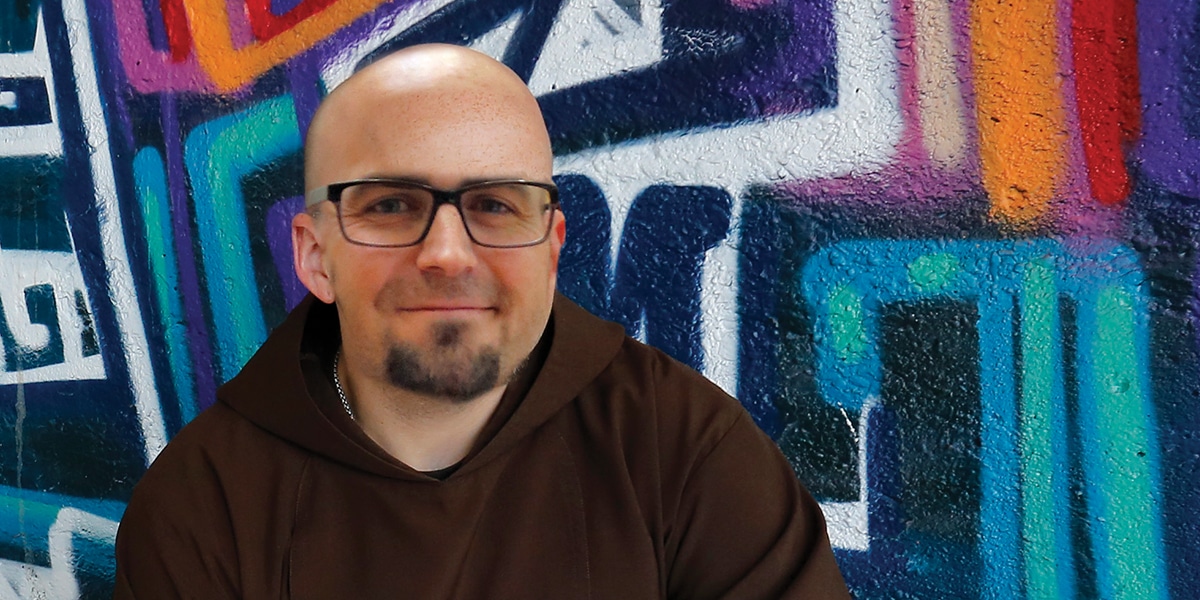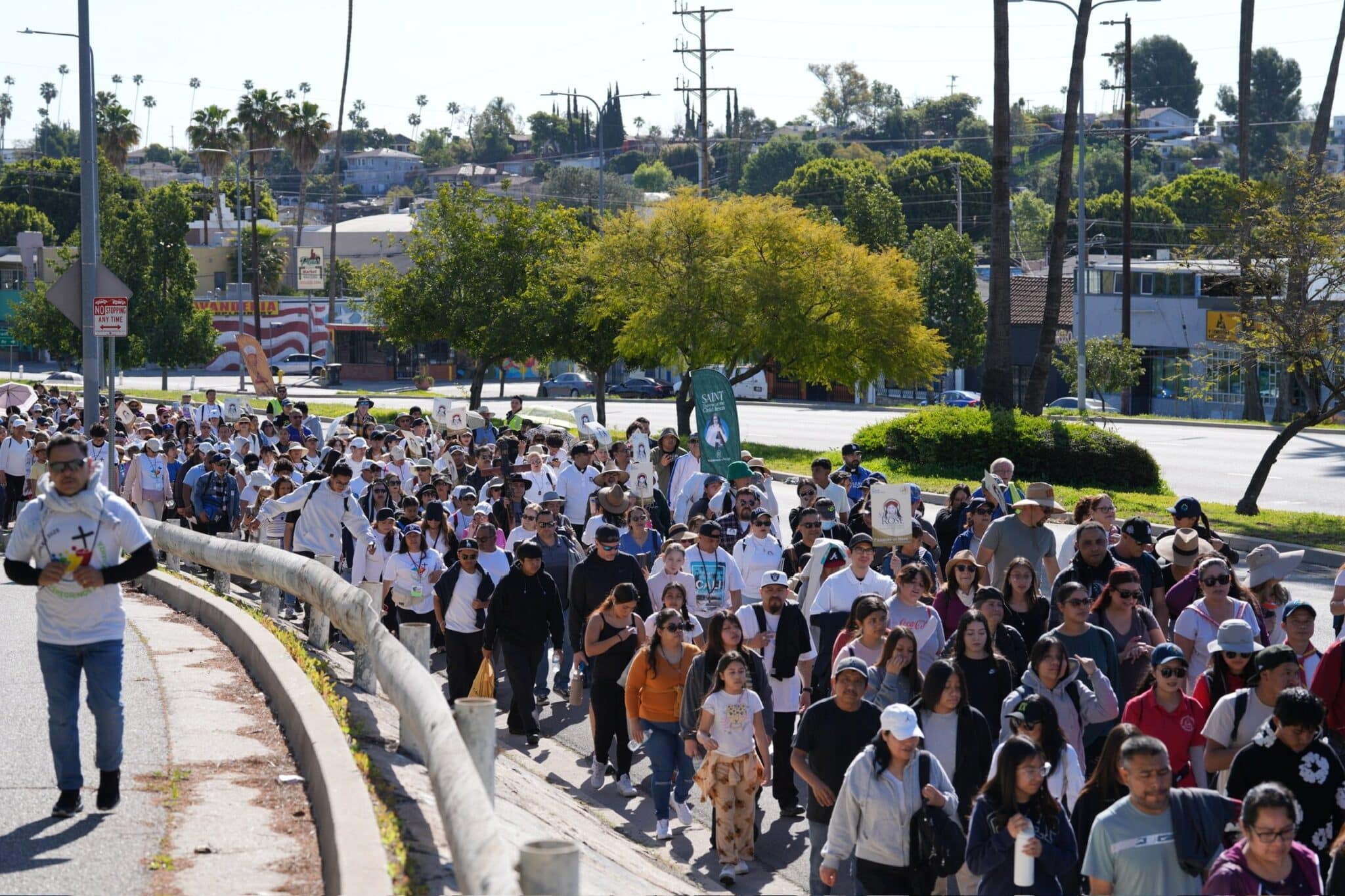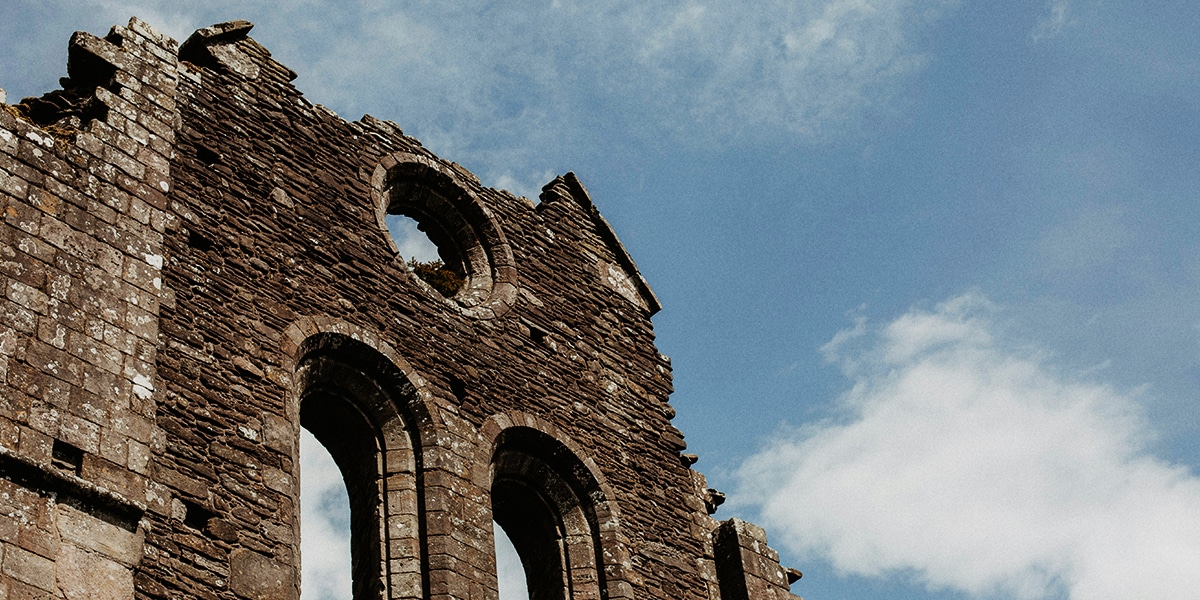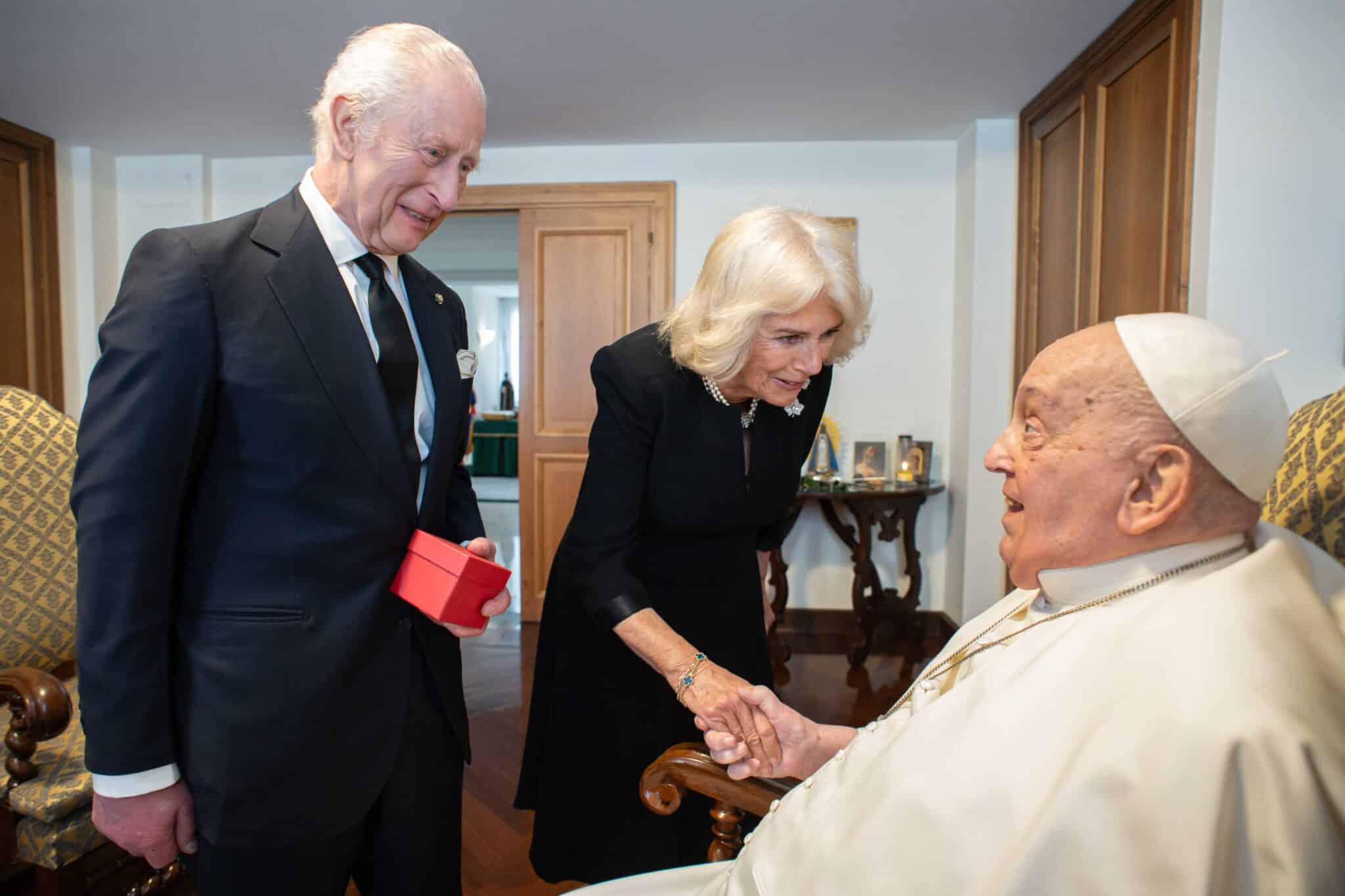As the nation battles an opioid crisis, Father M.J. Groark shares his story in hopes of showing others a path to recovery and redemption.
When Michael Joseph (M.J.) Groark found the Capuchin Friars, he knew he was home. He felt called to pursue a vocation to the priesthood, but he worried they might not let him enter. Covered in tattoos, he had “a hell of a backstory,” as he puts it, centered around his addiction to opioids, heroin, and other substances.
But after hearing M.J.’s story of addiction and recovery, sin and redemption, a friar told him, “You’re going to help so many people.”
Father M.J. was vested in the habit in 2009 and ordained a Capuchin priest on December 7, 2019. Currently based in Chicago, he serves as the vocation director for the Capuchin Franciscan Province of St. Joseph. Today, he gives talks to parish groups and other ministries on his backstory, which he says he receives many requests for, given the opioid crisis in the United States today. “You name it. I’ve done it. I’ve been to the gates of hell,” Father M.J. says.
Through those darkest days, his parents’ newfound Catholic faith sustained them and would provide a lifeline to M.J. Today he testifies to the transformation that took root the day he tagged along for Mass and experienced the presence of Jesus in a palpable way.
‘A Reckless Existence’
Raised Lutheran in Sacramento, California, Father M.J. grew up in a “poor, rough neighborhood.” His parents, however, worked hard to shield him and his brothers from negative influences and give them a happy childhood. They raised them to know the Bible and Jesus.
M.J.’s introduction to drugs came in high school in Portland, Oregon. He thought he would convert the school for Jesus but quickly learned that wasn’t the way to be popular with his classmates. “That was the first time in my life where I realized how easy it is to compartmentalize God, morality, my value system, in order to feel accepted,” he recalls.
He got into sports and cliques, and his interest in God waned. “Then I got into my experimental phase. About the 10th grade, I found out what marijuana was like and drinking and chasing girls,” Father M.J. recalls.
For many young people, these phases are temporary, but for others they can be the start of a dark trajectory. “That sort of harmless, experimental phase for me went from zero to 100 real quick,” says Father M.J. By his sophomore and junior years, he was “experimenting with every substance out there”—hallucinogens, amphetamines, alcohol.
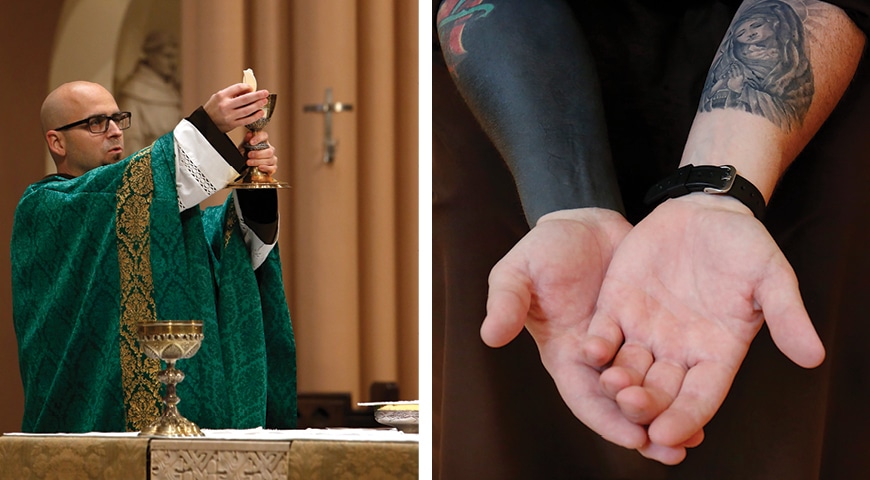
Some of Father M.J.’s tattoos are covered up, while others prominently feature religious imagery, a testament to his spiritual evolution.
“I was just living a reckless kind of existence,” Father M.J. recalls. Yet he was able to fool everyone into thinking that he was OK.
“I was very good at wearing masks. I would show up to church a couple of times a month in my Sunday-best clothes and make my parents think everything was great,” says Father M.J. “I was getting 4.0 grades at school, honor roll, the whole nine yards. I was a magician at life. No one knew who the real me was and the trouble I was getting into.”
At 16, M.J. started his first job at one of the camera stores his father oversaw as a district manager. He was a natural at both photography and sales, quickly becoming a top salesperson. All the while he continued to live in extremes.
“On the weekends, I was getting blackout drunk and high. I started selling drugs and running with gang members, living this crazy lifestyle that no one knew was bubbling in the background,” Father M.J. says.
Dealing drugs gave him more money to spend on using substances and partying, and it made him popular with his peers. He did so well in school he was on the verge of graduating early. He was also earning good money working for his dad.
“The day I graduated high school I was basically making more money than any of my teachers just on my salary alone. I was very cocky and prideful,” Father M.J. remembers.
A Dangerous Descent
The day after graduation, he was promoted to manager of a store in Portland, Oregon, that grossed $5 million annually. He oversaw a staff of a dozen.
At the same time, he continued dealing and taking more dangerous drugs. He worked at the store during the day and spent the nights partying. He was promoted two more times, making his dad proud. But around this time, in 2002, things began to turn. One day a friend told M.J. about a new drug that hit the streets called OxyContin and showed him how to chop and snort it. “The first pill that I did was like heaven, or at least what I thought heaven would be like,” he recalls. “That’s how evil this stuff is. It just embraced me totally and made me feel like Superman—and loved, I suppose.”
He quickly became hooked on OxyContin, taking multiple pills a day, unable to stop. Soon, he mixed the pills with other drugs in order to get the same high. Friends overdosed and died during this time, but M.J. thought he was invincible. Then the drugs started to become more expensive and harder to get. At this point, M.J. started calling in sick to work, and the image he was so careful to maintain was slipping. Then another friend approached him with a street-level heroin.
“I immediately found relief. Those were much easier to get. I was doing up to 10 balloons of heroin a day. I was able to kind of maintain this for a while, maybe a few more months,” still calling in sick and making excuses.
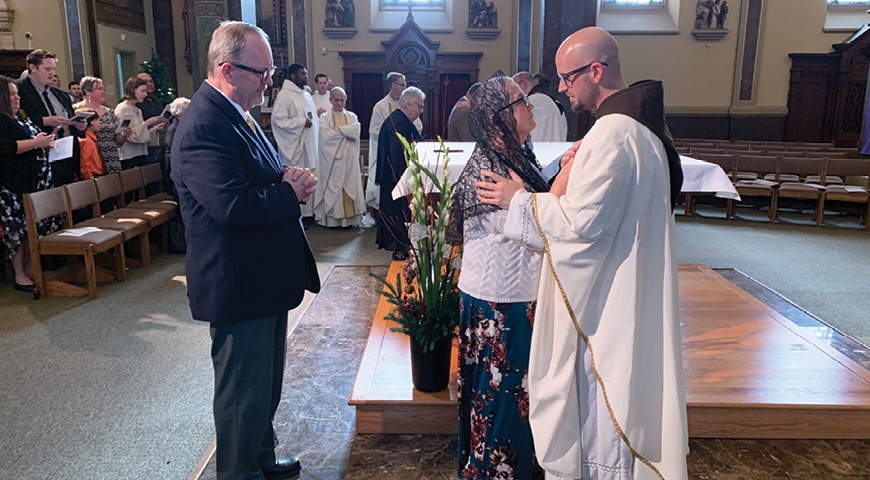
The newly ordained Father M.J. Groark performs his first priestly blessing upon his mother, Anna.
It all came to a head when his dad confronted him at work. It turned out his father was investigating him and had proof that his son was embezzling from the company.
“My dad is a strong man, a strong businessman, and he began to weep. That was a shocking moment for me, seeing my dad just cry,” Father M.J. says.
His father called him out and asked if he was on drugs. Instead of admitting what he had done and asking for help, he turned his back on his father and his promising future. “I’m standing there high on heroin, full of ego, and I remember being just like, ‘I don’t have time to listen to you, old man. I don’t need this crap.'”
His father fired him, and within 90 days the bank took everything he owned. M.J. ended up living on the streets of Portland.
“The last conversation that I had with either of my parents was when my dad fired me. I was so embarrassed and so addicted to heroin that I spent the next two years just eating out of trash cans, robbing people, and engaging in terrible behavior,” he says. For a period of time, he was with a woman who engaged in prostitution to support herself.
A Mother’s Prayer
When M.J. was a junior in high school, his parents had converted to Catholicism. While their son was on the streets not communicating with them, they were growing deeper in their faith. In 2006, they decided to take a pay cut and move from Vancouver, Washington, to Milwaukee, Wisconsin, to work for a Catholic religious goods store.
Their faith got them through the dark times when their son was on the streets, feeding his addiction. “Our faith was all we had,” says Anna Groark, Father M.J.’s mother. “We prayed almost constantly for several years. I went to daily Mass, asked everyone I could to pray for him.”
On the day of their move to Milwaukee, Anna went back into the empty house. She pictured her son and put him in the hands of Mary at the foot of the cross. She asked Mary to either put her son in jail or take him to heaven because then she’d know he was safe.
“I did not feel peace, however, until the night I prayed for Mother Mary to intercede on his behalf that he would be delivered from whatever hell he was in, whatever that meant—either recovery or death,” Anna says today. “I felt that even death would be better than not knowing where he was or what condition he would be in.”
Around this same time, M.J. hit bottom. “I just had this moment of clarity that this was enough. So I hustled up enough change to make a phone call because we had pay phones back then. I got 35 cents and I knew my dad’s cell phone number by heart.”
It is a day he will never forget.
“My dad picks up the phone and that’s the first time we had heard each other’s voices in two years. It was 3 p.m. in Milwaukee, and they were on their knees praying the Divine Mercy Chaplet for my deliverance.”
His parents asked M.J. where he was and sent his brothers who still lived in Portland to pick him up. They took him to the airport and on a plane bound for Milwaukee. All the while, he was detoxing from the drugs. He remembers getting off the plane wearing the clothes he had been in for months. He had a thick beard and no laces on his duct-taped shoes. At first, his mom walked right past him because she didn’t recognize him. His parents had prayed hard for their son to come back to them and, when their prayers were answered, they were overwhelmed.
“We knew M.J. was in trouble, but we did not know that the trouble was heroin until the evening before he arrived,” Anna recalls. “I spent the night trying to figure out what to do with a heroin addict. It’s not something that you would ever think you need to know.”
They took him to their apartment and started calling rehabs. They had trouble finding a place to take him because he had no insurance, there were waiting lists, and some were too expensive. So his parents said a rosary.
“I’m shaking and screaming and wailing, and they are praying for me,” says Father M.J. “The next click of a mouse on Google took my mom to a website for a place called Genesis in Milwaukee.”
Genesis was run by the city of Milwaukee and didn’t charge for treatment. “It was hell on earth, and it saved my life,” recalls Father M.J. “It was just the most amazing gift God could give me to be in this place.”
He spent about two months there. When he was released, his parents thought he was going to disappear again or seek out drugs. But he surprised them by saying he was tired of being miserable and asked that they take him to their church.
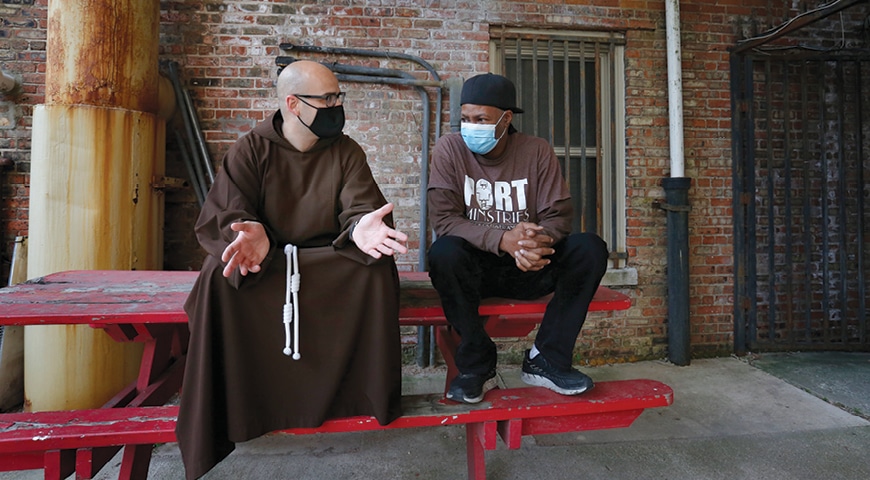
Father M.J. chats with Anthony Brown, bread truck coordinator for Port Ministries in Chicago, which provides food for those in need.
‘Jesus Is Here’
They took him to noon Mass at the Basilica of St. Josaphat, which is run by Conventual Franciscans, and left him in the back while they went to the front for Mass. It turned out to be another pivotal moment.
“I’m sitting in the very last pew, just totally broken and ashamed,” he remembers. “For some reason when I saw the priest with the Eucharist in his hand, it was the most real thing I’ve ever experienced. I thought, Jesus is truly here. Christ is present on this altar fully and substantially. I didn’t know that intellectually, but I knew it in my gut.”
He remembers feeling an invitation to ask Jesus for forgiveness.
“Every fiber and molecule in my body just said, ‘Run to him as fast as you can,'” Father M.J. recalls. “I didn’t know what that meant, or I didn’t even know what Catholics were, but I was 100 percent convinced that God was calling me to something.”
He held that in his heart and cried. Next, M.J. started getting his life together. He got a job and paid rent to his parents. He attended therapy and 12-step meetings. Eventually M.J. told his parents he wanted to become Catholic.
“On Easter Sunday 2007, I stood at the altar at St. Francis Church in Cedarburg, Wisconsin, and I got confirmed and I received my first Eucharist,” he says. “My parents are like levitating just watching their prodigal son come into the Church. ” Unbeknownst to his parents, when they took M.J. to Mass that first day he was out of rehab, God had started calling him to the priesthood. He broke the news on the way home from Mass the day he was received into the Church. His father almost wrecked the car.
That started a discernment period where M.J. explored becoming a priest for the archdiocese and also visited some religious orders. Nothing felt right. But one day he saw Franciscan Father Benedict Groschel talking about Father Solanus Casey. He spent that whole night searching online for everything he could find about Solanus, the Capuchins, and St. Francis of Assisi. “I started reading about Francis and I was just enthralled. I fell madly in love with this man.”
He emailed the Capuchin vocation director and met with him the next day. “He brought me to the friary in Chicago, and immediately I knew this was where I was supposed to be.”
“We were so thrilled,” recalls his mother. “I was a convert to Catholicism and Michael [my husband] was a revert. We had raised our children in the Lutheran tradition. I honestly never thought any of our three boys would be Catholic.” Now all three of her sons are Catholic.
Father M.J. knows he is one of the lucky ones to come out on the other side of opioid addiction. His is a story of hope when so many lives are lost to opioid addiction each year, one he feels called to share with others.
“It’s a story about metanoia and it’s a story about God,” he explains. “I’m the key player in this particular narrative, but really it tells me something about who God is, about God’s mercy and grace and patience, his commitment to me.”

